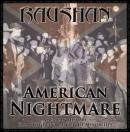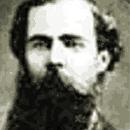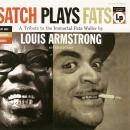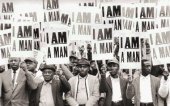Don't you see de black clouds
Risin' ober yonder,
Whar de Massa's old plantation am?
Neber you be frightened,
Dem is only darkies,
Come to jine an' fight for Uncle Sam,
Look out dar, now!
We's agwine to shoot!
Look out dar, don't you understand?
(Oh, don't you know dat)
Babylon is fallen!
Babylon is fallen!
An' we's agwine to occupy the land.
Don't you see the lightnin'
Flashin' in de canebrake,
Like as if we's gwine to hab a storm?
No! You is mistaken,
'Tis darkies' bay'nets,
An' de buttons on dar uniform.
Look out dar, now!
We's agwine to shoot!
Look out dar, don't you understand?
(Oh, don't you know dat)
Babylon is fallen!
Babylon is fallen!
An' we's agwine to occupy the land.
Way up in the cornfield,
Whar you hear de tunder,
Dat is our ole forty-pounder gun;
When the shells are missin',
Den we load wid punkins,
All de same to make the cowards run.
Look out dar, now!
We's agwine to shoot!
Look out dar, don't you understand?
(Oh, don't you know dat)
Babylon is fallen!
Babylon is fallen!
An' we's agwine to occupy the land.
Mass was de Kernel
In de Rebel army,
Eber sence he went an' run away;
But his lubly darkies,
Dey has been a-watchin',
An' dey take him pris'ner tudder day.
Look out dar, now!
We's agwine to shoot!
Look out dar, don't you understand?
(Oh, don't you know dat)
Babylon is fallen!
Babylon is fallen!
An' we's agwine to occupy the land.
We will be be the Massa,
He will be the sarvant,
Try him how he like it for a spell;
So we crack de Butt'nuts,
So we take the Kernel,
So the cannon carry back de shell.
Look out dar, now!
We's agwine to shoot!
Look out dar, don't you understand?
(Oh, don't you know dat)
Babylon is fallen!
Babylon is fallen!
An' we's agwine to occupy the land.
Risin' ober yonder,
Whar de Massa's old plantation am?
Neber you be frightened,
Dem is only darkies,
Come to jine an' fight for Uncle Sam,
Look out dar, now!
We's agwine to shoot!
Look out dar, don't you understand?
(Oh, don't you know dat)
Babylon is fallen!
Babylon is fallen!
An' we's agwine to occupy the land.
Don't you see the lightnin'
Flashin' in de canebrake,
Like as if we's gwine to hab a storm?
No! You is mistaken,
'Tis darkies' bay'nets,
An' de buttons on dar uniform.
Look out dar, now!
We's agwine to shoot!
Look out dar, don't you understand?
(Oh, don't you know dat)
Babylon is fallen!
Babylon is fallen!
An' we's agwine to occupy the land.
Way up in the cornfield,
Whar you hear de tunder,
Dat is our ole forty-pounder gun;
When the shells are missin',
Den we load wid punkins,
All de same to make the cowards run.
Look out dar, now!
We's agwine to shoot!
Look out dar, don't you understand?
(Oh, don't you know dat)
Babylon is fallen!
Babylon is fallen!
An' we's agwine to occupy the land.
Mass was de Kernel
In de Rebel army,
Eber sence he went an' run away;
But his lubly darkies,
Dey has been a-watchin',
An' dey take him pris'ner tudder day.
Look out dar, now!
We's agwine to shoot!
Look out dar, don't you understand?
(Oh, don't you know dat)
Babylon is fallen!
Babylon is fallen!
An' we's agwine to occupy the land.
We will be be the Massa,
He will be the sarvant,
Try him how he like it for a spell;
So we crack de Butt'nuts,
So we take the Kernel,
So the cannon carry back de shell.
Look out dar, now!
We's agwine to shoot!
Look out dar, don't you understand?
(Oh, don't you know dat)
Babylon is fallen!
Babylon is fallen!
An' we's agwine to occupy the land.
Contributed by Bernart Bartleby - 2015/8/28 - 11:15
×
![]()
Note for non-Italian users: Sorry, though the interface of this website is translated into English, most commentaries and biographies are in Italian and/or in other languages like French, German, Spanish, Russian etc.








Parole e musica di Henry Clay Work
Come per la più famosa Kingdom Coming (the Year of the Jubilo) anche in quest’altra canzone l’autore adotta la parlata dei “darkies”, dei “niggers”, degli schiavi del sud, visto che il protagonista – un cosiddetto “contraband”, un ex schiavo arruolatosi nell’esercito nordista – è uno di loro.
La canzone fu composta nelle settimane immediatamente successive l’“Emancipation Proclamation”, l’ordine esecutivo che il Presidente Abraham Lincoln emise il 1 gennaio 1863 con cui circa 3 milioni di schiavi furono proclamati liberi.
Henry Clay Work (1832-1884), songwriter e compositore, veniva da una famiglia di convinti abolizionisti. Nella prima metà dell’800 la casa dei Work a Middletown, Connecticut, divenne un’importante base dell’“Underground Railroad”, la rete clandestina che assisteva gli schiavi neri che fuggivano verso il nord. Il padre di Henry Clay Work aiutava i fuggiaschi a passare in Canada e fu per questo arrestato e imprigionato.